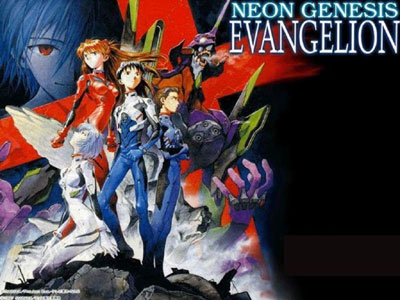
Background:
Premiering in March 1996 on TV Tokyo; Neon Genesis Evangelion appeared
at first to be standard mecha fare, but it was to become one the most
controversial anime series pushing the boundaries of science
fiction, storytelling, animation and some would say good taste.
The series had an initial run of 26 episodes and 2 movies followed,
"Death and Rebirth" and "End of Evangelion". Death and Rebirth was
mostly cobbled together from bits of the series, with some new
footage thrown in. End of Evangelion attempted to bring a conclusion
to the story with entirely new material stretching over two episodes.
Confusingly, End of Evangelion puts itself forward as episodes 25 and
26, meaning there are two of each episode! This was done because the
creators of Evangelion ran out of money before the series could be
brought to a proper conclusion, End of Evangelion was an attempt (and
I *mean* attempt!) to tie the story up.
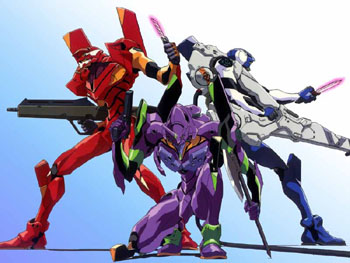 Evangelion's director, Hideaki Anno, did not have it easy in his goal of
bringing this landmark series to the screen. It's subject matter is not
somthing people feel comfortable with, especially anyone with strong
religious beliefs. In fact the animators are reported to have recieved
death threats, which they included in certain scenes.
Evangelion's director, Hideaki Anno, did not have it easy in his goal of
bringing this landmark series to the screen. It's subject matter is not
somthing people feel comfortable with, especially anyone with strong
religious beliefs. In fact the animators are reported to have recieved
death threats, which they included in certain scenes.
Story:
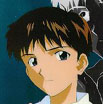 Shinji Ikari has every right to be upset. His father, Gendo, has gotten
back in touch with him after coldly abandoning him shortly after the
death of Shinji's mother Yui, 10 years ago. It soon becomes clear that
Gendo's new found interest in Shinji is not motivated by any parental
feelings, Gendo needs Shinji because he can be of use to him.
Shinji Ikari has every right to be upset. His father, Gendo, has gotten
back in touch with him after coldly abandoning him shortly after the
death of Shinji's mother Yui, 10 years ago. It soon becomes clear that
Gendo's new found interest in Shinji is not motivated by any parental
feelings, Gendo needs Shinji because he can be of use to him.
The world is not in the best of shape either. In August 2000 a
cosmic object hit antarctica at close to the speed of light, instantly
melting the entire continent and causing a worldwide rise in sea level
and a drastic climate change. Seasons no longer exist, it will always be
summer. This event is refferred to as the Second Impact. Even though half the worlds population was lost in the
aftermath, humanity has recovered and society appears to be returning to
some normality by 2015.
Well, as normal as you can get when an unidentified creature, refferred
to as an "Angel", appears above Japan's third capital city, Tokyo-3.
Shinji arrives in Tokyo 3 at his fathers behest, straight into the
middle of this Angel attack. He is taken by Captain Misato Katsuragi to the headquarters of NERV, an
organisation headed by his father who explains his true reason for
contacting Shinji, he wants him to pilot a giant robotic fighting
machine called an Eva, the only weapon capable of defeating the Angels.
After berating his father for lying to him, and initially refusing to
pilot the Eva, Shinji reluctantly takes control of the strange machine
and defeats the Angel. Even though this is his first battle, Shinji
appears to have a natural talent for piloting Eva.
From the first episode we get the feeling that nothing is what it
appears to be. Shinji is no hero, he hates being an Eva pilot and admits
even to himself that he is selfish, mean and cowardly. He also appears
to be somewhat mentally unstable, somthing happenes in nearly every
episode that causes Shinji to freak out. Shinji's relationship with his
father is a constant them throughout the series. He may hate
Gendo for abandoning him but seems to pilot Eva Unit 01 in order to
appear useful in his fathers eyes. 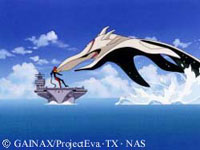 The series
focuses on Shinji's character at first but quickly expands outwards to
focus on the motivations and back stories of the main players: Misato,
Ritsuko, Gendo and fellow Evangelion pilots Rei Ayanami and Asuka
Langley Soryu. The Angels begin to attack frequently, taking wildly
different forms each time, and they are beaten back by the 3
Evangelions. Sometimes only just. But what are the Angels?, why do
they have a 99.99% DNA match with humans?, who or what is Rei Ayanami?, what does NERV and SEELE know
about the events surrounding the second impact?. And perhaps most
important of all, what are the Evas?
The series
focuses on Shinji's character at first but quickly expands outwards to
focus on the motivations and back stories of the main players: Misato,
Ritsuko, Gendo and fellow Evangelion pilots Rei Ayanami and Asuka
Langley Soryu. The Angels begin to attack frequently, taking wildly
different forms each time, and they are beaten back by the 3
Evangelions. Sometimes only just. But what are the Angels?, why do
they have a 99.99% DNA match with humans?, who or what is Rei Ayanami?, what does NERV and SEELE know
about the events surrounding the second impact?. And perhaps most
important of all, what are the Evas?
More of this becomes clear as the series progresses, and things go from
bad to worse. The Angel attacks are largely sidelined as the series
turns inwards about halfway through to shed some light on its
characters, examining their inner minds and attempting to define what
each wants out of life. These scenes may deter less patient people, but
the writers still managed to maintain the pace of the show.
From that description, it may come across as pretty heavyweight stuff,
but humour and slapstick are often used throughout the series to
great effect, providing some relief from the dark themes of the show.
End of Evangelion?
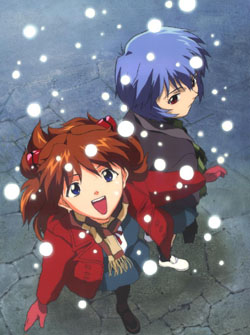 In 1998 Evangelion finished its run with two episodes, set inside
Shinji's mind. After the death, at Shinji's hand, of the last Angel
Tabris (an Angel in human form who he had befriended), Shinji is
typically distraught and we are presented with flashbacks and facets of
his own mind represented as people he knows, in an attempt to unravel
his psyche. These episodes were not particularly popular with fans, and
some saw it as a cop out that brought no real conclusion to the story.
So for this reason the two movies Death & Rebirth and End of Evangelion
were produced. Death & Rebirth doesnt really add anything, being more of
an overview of the series rather than a film in its own right, sort of
like "Evangelion for dummies". However, End of Evangelion does make an
attempt at an ending, but you may be even more confused/disturbed by it
than anything else in the series.
In 1998 Evangelion finished its run with two episodes, set inside
Shinji's mind. After the death, at Shinji's hand, of the last Angel
Tabris (an Angel in human form who he had befriended), Shinji is
typically distraught and we are presented with flashbacks and facets of
his own mind represented as people he knows, in an attempt to unravel
his psyche. These episodes were not particularly popular with fans, and
some saw it as a cop out that brought no real conclusion to the story.
So for this reason the two movies Death & Rebirth and End of Evangelion
were produced. Death & Rebirth doesnt really add anything, being more of
an overview of the series rather than a film in its own right, sort of
like "Evangelion for dummies". However, End of Evangelion does make an
attempt at an ending, but you may be even more confused/disturbed by it
than anything else in the series.
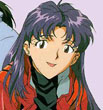 After the destruction of the last Angel, NERV seems to be an
organisation without purpose. Until it is suddenly and brutally attacked
by the army, secret agendas are revealed. And the conspiracy
seems to go farther than anyone could have imagined. Being set up to
fight angels, NERV is ill equipped to repel human attackers. It doesnt
help that Shinji flatly refuses to pilot his Eva against the army, he is
completly without motivation. Asuka however, suddenly awakes from a coma
and finds the strength to defeat the attackers with her Eva. Things take
a turn for the worse when 5 production model Evas arrive and challenge
Asuka. I will not try to describe what happens next, it would be spoiler
and I don't really have the words for it.
I am convinced that this series really defies description. The first
time I saw it right through, from episodes 1 to 26, I really was unsure
as to what I had just seen. It is, for want of better words, fucked up.
Even by Japanese standards this series deals with uncharted territory.
Religion, Psychology and Philosophy all come into play to deliver
somthing truly unique.
After the destruction of the last Angel, NERV seems to be an
organisation without purpose. Until it is suddenly and brutally attacked
by the army, secret agendas are revealed. And the conspiracy
seems to go farther than anyone could have imagined. Being set up to
fight angels, NERV is ill equipped to repel human attackers. It doesnt
help that Shinji flatly refuses to pilot his Eva against the army, he is
completly without motivation. Asuka however, suddenly awakes from a coma
and finds the strength to defeat the attackers with her Eva. Things take
a turn for the worse when 5 production model Evas arrive and challenge
Asuka. I will not try to describe what happens next, it would be spoiler
and I don't really have the words for it.
I am convinced that this series really defies description. The first
time I saw it right through, from episodes 1 to 26, I really was unsure
as to what I had just seen. It is, for want of better words, fucked up.
Even by Japanese standards this series deals with uncharted territory.
Religion, Psychology and Philosophy all come into play to deliver
somthing truly unique.
- Rob Gallagher
 Evangelion's director, Hideaki Anno, did not have it easy in his goal of
bringing this landmark series to the screen. It's subject matter is not
somthing people feel comfortable with, especially anyone with strong
religious beliefs. In fact the animators are reported to have recieved
death threats, which they included in certain scenes.
Evangelion's director, Hideaki Anno, did not have it easy in his goal of
bringing this landmark series to the screen. It's subject matter is not
somthing people feel comfortable with, especially anyone with strong
religious beliefs. In fact the animators are reported to have recieved
death threats, which they included in certain scenes.

 Shinji Ikari has every right to be upset. His father, Gendo, has gotten
back in touch with him after coldly abandoning him shortly after the
death of Shinji's mother Yui, 10 years ago. It soon becomes clear that
Gendo's new found interest in Shinji is not motivated by any parental
feelings, Gendo needs Shinji because he can be of use to him.
Shinji Ikari has every right to be upset. His father, Gendo, has gotten
back in touch with him after coldly abandoning him shortly after the
death of Shinji's mother Yui, 10 years ago. It soon becomes clear that
Gendo's new found interest in Shinji is not motivated by any parental
feelings, Gendo needs Shinji because he can be of use to him.
 The series
focuses on Shinji's character at first but quickly expands outwards to
focus on the motivations and back stories of the main players: Misato,
Ritsuko, Gendo and fellow Evangelion pilots Rei Ayanami and Asuka
Langley Soryu. The Angels begin to attack frequently, taking wildly
different forms each time, and they are beaten back by the 3
Evangelions. Sometimes only just. But what are the Angels?, why do
they have a 99.99% DNA match with humans?, who or what is Rei Ayanami?, what does NERV and SEELE know
about the events surrounding the second impact?. And perhaps most
important of all, what are the Evas?
The series
focuses on Shinji's character at first but quickly expands outwards to
focus on the motivations and back stories of the main players: Misato,
Ritsuko, Gendo and fellow Evangelion pilots Rei Ayanami and Asuka
Langley Soryu. The Angels begin to attack frequently, taking wildly
different forms each time, and they are beaten back by the 3
Evangelions. Sometimes only just. But what are the Angels?, why do
they have a 99.99% DNA match with humans?, who or what is Rei Ayanami?, what does NERV and SEELE know
about the events surrounding the second impact?. And perhaps most
important of all, what are the Evas?
 In 1998 Evangelion finished its run with two episodes, set inside
Shinji's mind. After the death, at Shinji's hand, of the last Angel
Tabris (an Angel in human form who he had befriended), Shinji is
typically distraught and we are presented with flashbacks and facets of
his own mind represented as people he knows, in an attempt to unravel
his psyche. These episodes were not particularly popular with fans, and
some saw it as a cop out that brought no real conclusion to the story.
So for this reason the two movies Death & Rebirth and End of Evangelion
were produced. Death & Rebirth doesnt really add anything, being more of
an overview of the series rather than a film in its own right, sort of
like "Evangelion for dummies". However, End of Evangelion does make an
attempt at an ending, but you may be even more confused/disturbed by it
than anything else in the series.
In 1998 Evangelion finished its run with two episodes, set inside
Shinji's mind. After the death, at Shinji's hand, of the last Angel
Tabris (an Angel in human form who he had befriended), Shinji is
typically distraught and we are presented with flashbacks and facets of
his own mind represented as people he knows, in an attempt to unravel
his psyche. These episodes were not particularly popular with fans, and
some saw it as a cop out that brought no real conclusion to the story.
So for this reason the two movies Death & Rebirth and End of Evangelion
were produced. Death & Rebirth doesnt really add anything, being more of
an overview of the series rather than a film in its own right, sort of
like "Evangelion for dummies". However, End of Evangelion does make an
attempt at an ending, but you may be even more confused/disturbed by it
than anything else in the series.
 After the destruction of the last Angel, NERV seems to be an
organisation without purpose. Until it is suddenly and brutally attacked
by the army, secret agendas are revealed. And the conspiracy
seems to go farther than anyone could have imagined. Being set up to
fight angels, NERV is ill equipped to repel human attackers. It doesnt
help that Shinji flatly refuses to pilot his Eva against the army, he is
completly without motivation. Asuka however, suddenly awakes from a coma
and finds the strength to defeat the attackers with her Eva. Things take
a turn for the worse when 5 production model Evas arrive and challenge
Asuka. I will not try to describe what happens next, it would be spoiler
and I don't really have the words for it.
I am convinced that this series really defies description. The first
time I saw it right through, from episodes 1 to 26, I really was unsure
as to what I had just seen. It is, for want of better words, fucked up.
Even by Japanese standards this series deals with uncharted territory.
Religion, Psychology and Philosophy all come into play to deliver
somthing truly unique.
After the destruction of the last Angel, NERV seems to be an
organisation without purpose. Until it is suddenly and brutally attacked
by the army, secret agendas are revealed. And the conspiracy
seems to go farther than anyone could have imagined. Being set up to
fight angels, NERV is ill equipped to repel human attackers. It doesnt
help that Shinji flatly refuses to pilot his Eva against the army, he is
completly without motivation. Asuka however, suddenly awakes from a coma
and finds the strength to defeat the attackers with her Eva. Things take
a turn for the worse when 5 production model Evas arrive and challenge
Asuka. I will not try to describe what happens next, it would be spoiler
and I don't really have the words for it.
I am convinced that this series really defies description. The first
time I saw it right through, from episodes 1 to 26, I really was unsure
as to what I had just seen. It is, for want of better words, fucked up.
Even by Japanese standards this series deals with uncharted territory.
Religion, Psychology and Philosophy all come into play to deliver
somthing truly unique.